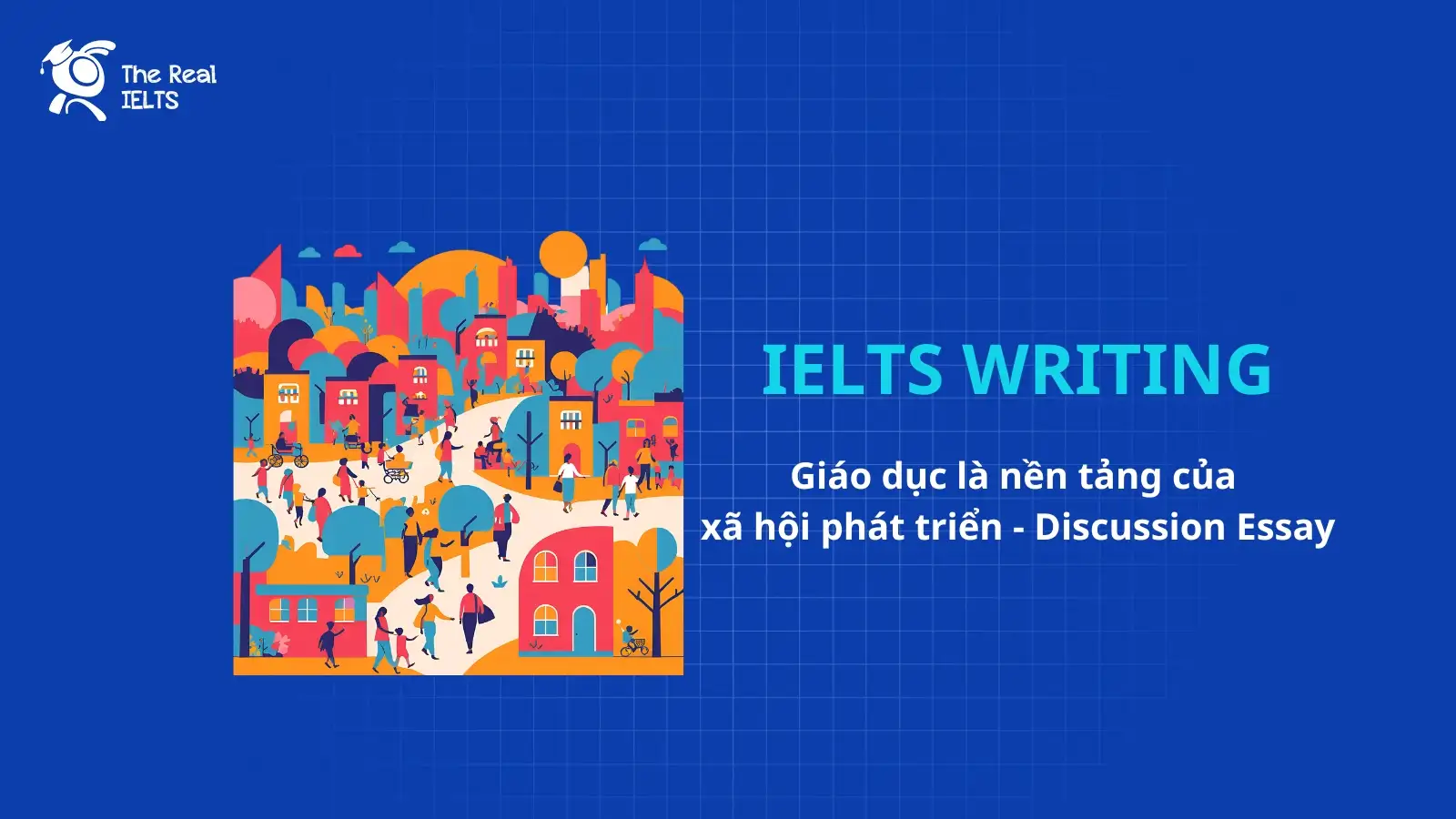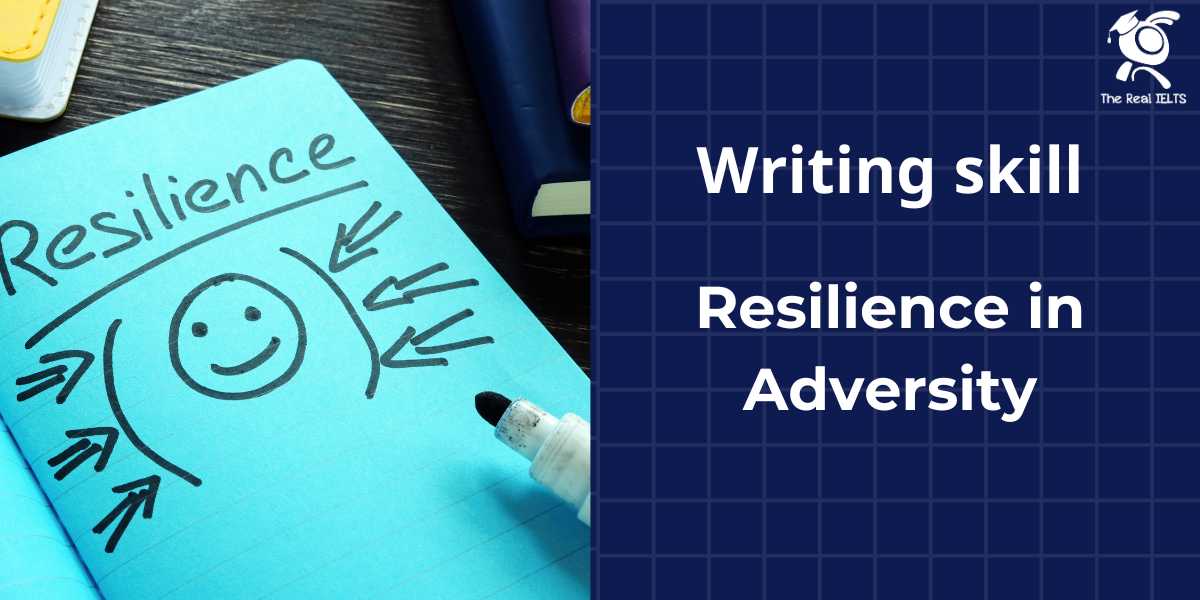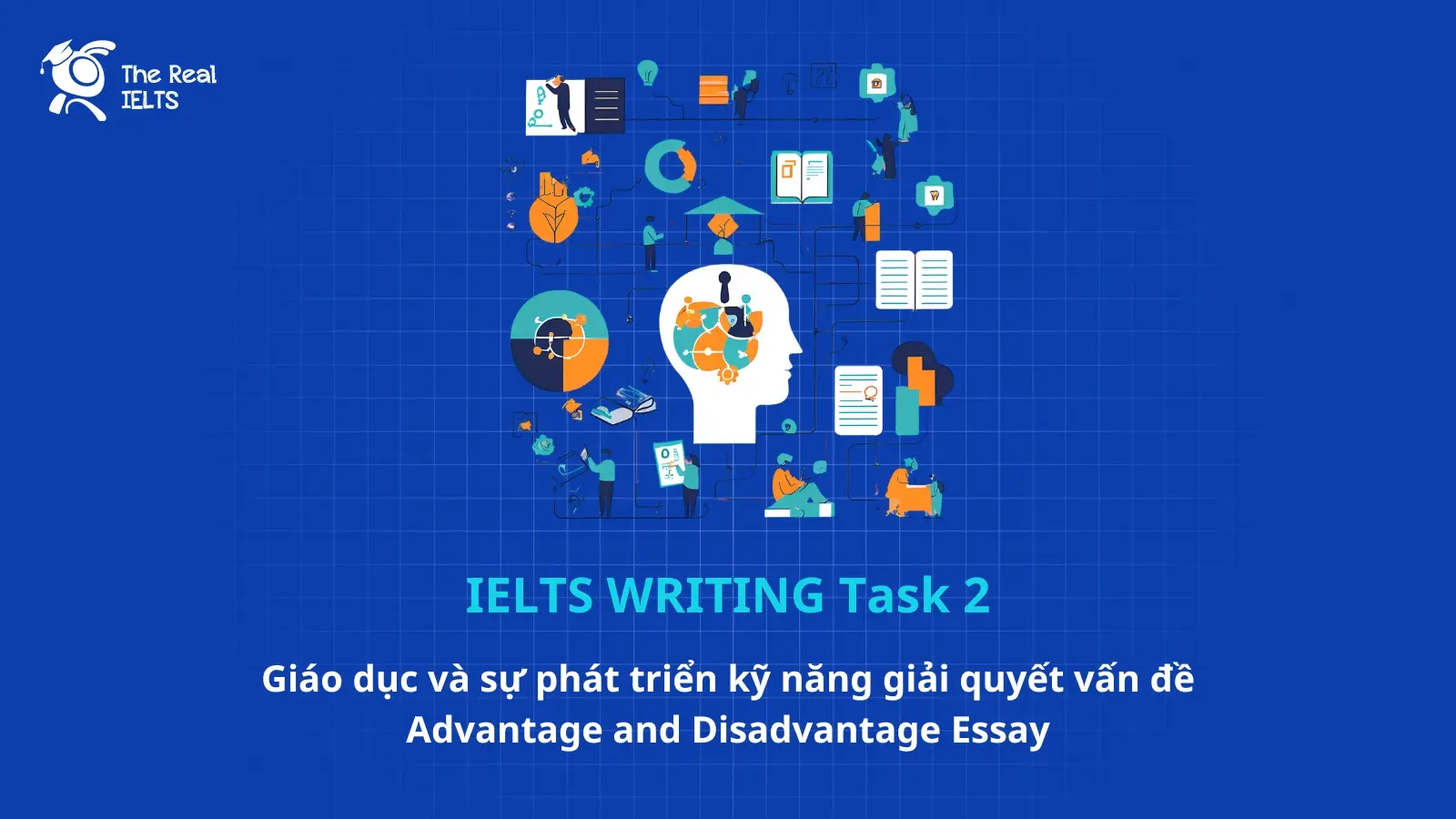Nâng band điểm IELTS Writing Task 2 dạng Discussion Essay với chủ đề “Giáo dục là nền tảng của xã hội phát triển”. Tìm hiểu cách phân tích đề bài, lập luận hai chiều, và viết bài mạch lạc, ấn tượng.
Đề bài IELTS Writing Task 2: Giáo dục là nền tảng của xã hội phát triển – Discussion Essay
Some people believe that education is the key to a developed society, while others argue that other factors, such as technology and economy, play a more crucial role. Discuss both views and give your own opinion.
Câu trả lời 1
People have different views on what drives the development of a society. Some argue that education is the key factor, while others believe that economic growth and technological advancements play a more crucial role. This essay will discuss both perspectives before presenting my own opinion.
On the one hand, education is widely considered the foundation of a developed society. A well-educated population contributes to economic growth by providing skilled labor and fostering innovation. Moreover, education promotes social awareness, critical thinking, and responsible citizenship, leading to better governance and lower crime rates. Additionally, it helps reduce social inequalities by providing equal opportunities for individuals from different backgrounds, ultimately contributing to a more stable and prosperous society.
On the other hand, some believe that factors such as economic stability and technological advancements are more important. A strong economy provides resources for infrastructure development, healthcare, and welfare systems, all of which improve the quality of life. Without economic prosperity, even the best education systems may fail due to a lack of funding. Similarly, technological progress drives industrial and social transformation, increasing efficiency and connectivity across different sectors. Countries with advanced technology often experience rapid development, even in cases where education systems are still improving.
In my opinion, while education is a crucial driver of societal progress, it cannot function effectively in isolation. Economic growth and technological advancements are equally essential, as they provide the financial and structural support needed for education to thrive. Therefore, a balanced approach that integrates education, economic stability, and technological progress is the most effective way to achieve long-term societal development.
In conclusion, education plays a fundamental role in societal development by fostering knowledge, skills, and equality. However, economic stability and technological advancements are equally important, as they provide the foundation for sustainable progress. Thus, while education is essential, it should be complemented by strong economic and technological growth to ensure holistic societal development.
Câu trả lời 2
The recipe for a developed society is a complex one, with various ingredients contributing to its success. While some champion education as the primary catalyst, others prioritize factors like technological advancements and economic prosperity. This essay will delve into both perspectives before presenting my own viewpoint.
Proponents of education as the cornerstone of development argue that it empowers individuals with knowledge, critical thinking skills, and adaptability. An educated populace is better equipped to innovate, solve complex problems, and contribute to economic growth. Furthermore, education fosters social progress by promoting tolerance, understanding, and civic engagement. It empowers citizens to make informed decisions, participate actively in democratic processes, and demand accountability from their leaders. Through education, societies can cultivate a culture of lifelong learning and continuous improvement, essential for navigating the challenges of a rapidly changing world.
Conversely, others contend that factors like technological advancements and a robust economy are more pivotal in driving societal development. Technological progress can revolutionize industries, improve infrastructure, and enhance the overall quality of life. A strong economy provides the resources necessary for investment in education, healthcare, and other essential services. Moreover, economic prosperity can create job opportunities, reduce poverty, and foster social stability. These proponents argue that while education is important, it is ultimately ineffective without the supporting framework of a thriving economy and advanced technology.
While both sides present compelling arguments, I believe that education forms the foundation upon which a truly developed society is built. While technology and economic strength are undoubtedly crucial, they are ultimately tools that are best utilized by an educated populace. Education provides the intellectual capital needed to harness technological advancements and manage economic resources effectively. Furthermore, it fosters the values, ethics, and social consciousness necessary for creating a just and equitable society. A technologically advanced and economically prosperous society without a strong educational foundation risks exacerbating inequalities and failing to address fundamental social issues.
In conclusion, while technological progress and economic prosperity are important ingredients in the recipe for a developed society, education remains the essential element that binds them together and unlocks their full potential. By prioritizing education, societies can cultivate the human capital necessary to drive sustainable and inclusive development.
Câu trả lời 3
Education is often regarded as the key to building a developed society. However, some believe that other factors, such as technology and economic strength, are more important in driving societal progress. This essay will discuss both perspectives and explain why I believe education is the most critical factor in achieving a developed society.
On the one hand, education is seen as the backbone of a developed society because it empowers individuals with knowledge, skills, and values that contribute to overall progress. Education promotes literacy, critical thinking, and innovation, which are essential for addressing societal challenges and fostering development. For example, countries with strong education systems, such as Finland and South Korea, consistently rank high in measures of societal well-being, including economic performance, healthcare, and equality. Furthermore, education serves as the foundation for advancements in technology and economic growth by producing skilled professionals who drive innovation and productivity.
On the other hand, some argue that technology and the economy play a more crucial role in societal development. Technological advancements, such as artificial intelligence and renewable energy, have revolutionized industries and improved the quality of life for millions of people. Similarly, a strong economy provides the resources needed to invest in infrastructure, healthcare, and other critical areas. For example, countries like the United States and China have achieved remarkable development partly due to their technological leadership and robust economies. Proponents of this view argue that without these factors, education alone would struggle to translate into tangible societal progress.
In my opinion, while technology and the economy are undoubtedly important, they rely heavily on education to flourish. Education acts as the enabler of technological innovation and economic development by creating a skilled workforce and informed citizens who can effectively harness these resources. Without a strong educational foundation, technological advancements may not be utilized effectively, and economic growth may remain uneven, exacerbating inequality. For instance, developing countries with underfunded education systems often struggle to fully benefit from technological or economic opportunities.
In conclusion, while technology and the economy are significant contributors to a developed society, education is the key factor that underpins their success. A well-educated population is the driving force behind innovation, economic prosperity, and social cohesion, making education the cornerstone of sustainable societal progress.
Câu trả lời 4
Education is widely regarded as the foundation of a developed society. While other factors such as economic growth and technological advancements also contribute to societal progress, I strongly agree that education plays the most fundamental role in shaping a nation’s development.
Firstly, education fosters a knowledgeable and skilled workforce, which is essential for economic growth. A well-educated population enhances productivity and innovation, driving industries forward and creating job opportunities. Countries with strong education systems, such as Finland and Singapore, consistently demonstrate higher economic stability and social progress. Without education, a society risks stagnation due to a lack of expertise and adaptability in an ever-changing world.
Secondly, education promotes social cohesion and equality by providing individuals with the tools to make informed decisions. It reduces crime rates, improves public health, and encourages civic engagement. For instance, societies with higher literacy rates tend to have lower levels of corruption and better governance, as educated citizens are more likely to demand transparency and accountability from their leaders. Furthermore, education empowers marginalized groups, bridging socio-economic gaps and fostering inclusivity.
However, it is important to acknowledge that education alone cannot ensure societal development. Other factors, such as sound governance, economic policies, and technological advancements, also play crucial roles. Nonetheless, these elements are often strengthened by an educated population that can innovate, lead, and sustain progress.
In conclusion, while multiple factors contribute to a developed society, education remains the most essential pillar. It nurtures intellectual growth, fuels economic prosperity, and fosters social stability, making it the cornerstone of any successful nation.
Câu trả lời 5
There is an ongoing debate about whether education is the key driver of societal development or whether other factors, such as technology and the economy, play a more critical role. While education is undeniably essential, some argue that technological advancements and economic growth are more influential. This essay will discuss both perspectives before presenting my own opinion.
On the one hand, education is considered the foundation of a prosperous society. It equips individuals with knowledge and skills, enabling them to contribute meaningfully to various industries. A well-educated workforce leads to higher productivity, innovation, and improved decision-making. Furthermore, education promotes social stability by fostering critical thinking, ethical values, and civic engagement. For example, countries with strong educational systems, such as Finland and South Korea, tend to have higher living standards and lower crime rates.
On the other hand, technology and economic development also play a crucial role in shaping a developed society. Technological advancements drive industrial growth, enhance healthcare systems, and improve overall quality of life. For instance, innovations in artificial intelligence and automation have transformed global economies, increasing efficiency and connectivity. Additionally, a strong economy provides resources for infrastructure, healthcare, and public services, all of which contribute to societal well-being. Countries like the United States and China, which prioritize technological and economic growth, have achieved significant global influence and prosperity.
In my opinion, while education is vital, it must work in tandem with technological and economic progress to achieve sustainable development. Education lays the groundwork for skilled professionals, but without technological innovation and economic stability, a society may struggle to advance. Therefore, a balanced approach that integrates education, technology, and economic policies is the most effective way to ensure long-term societal development.
Câu trả lời 6
Education is widely regarded as a fundamental pillar of a developed society, as it equips individuals with the necessary knowledge and skills to contribute to economic and social progress. However, some argue that other factors, such as technological advancements and economic policies, play a more significant role in societal development. This essay will examine both perspectives before presenting my own opinion.
On the one hand, education is essential for fostering human capital, innovation, and social stability. A well-educated workforce enhances productivity, drives economic growth, and enables technological progress. For example, developed nations such as Japan and Germany have strong education systems that contribute to their economic success. Additionally, education promotes civic responsibility, reduces crime rates, and encourages equality by providing individuals with opportunities to improve their social status. Without a solid educational foundation, even the most advanced economies would struggle to sustain long-term development.
On the other hand, some argue that factors such as technology and economic policies have a more direct impact on societal progress. Technological advancements drive industrial growth, improve healthcare, and increase efficiency in various sectors. For instance, countries like the United States and China have leveraged technology to achieve rapid economic expansion. Similarly, strong economic policies, including trade agreements and infrastructure investments, create a stable environment for businesses to thrive, ultimately leading to national prosperity. Without a robust economy and technological innovation, even a well-educated population may face limited opportunities.
In my opinion, while education is a crucial factor, it must work in tandem with technology and economic policies to ensure sustainable development. Education provides the foundation, but without economic opportunities and technological progress, its impact may be limited. Therefore, a balanced approach that integrates all these elements is necessary for a truly developed society.
Both education and other factors, such as technology and economic policies, play vital roles in societal development. While education lays the groundwork for an informed and skilled population, economic stability and technological advancements ensure that progress is sustained. Thus, a holistic approach that prioritizes all these aspects is essential for long-term national growth.
Câu trả lời 7
People have different perspectives on what drives societal development. While some argue that education is the key to progress, others believe that factors such as technology and economic growth play a more significant role. This essay will examine both views before presenting my own opinion.
On the one hand, education is often considered the foundation of a developed society. Firstly, it equips individuals with the knowledge and skills necessary for innovation and economic productivity. A well-educated workforce enhances a country’s competitiveness in the global market, leading to economic prosperity. Secondly, education fosters social stability by promoting equality and reducing crime rates. People with better education tend to have higher employment opportunities, which lowers poverty levels and social unrest. Lastly, education encourages civic engagement and ethical awareness, ensuring that citizens make informed decisions in governance and environmental sustainability.
On the other hand, some argue that technology and economic growth are more crucial to development. Technological advancements drive progress in various fields, such as healthcare, communication, and transportation, improving overall quality of life. For instance, countries that invest heavily in technology, such as the United States and China, have achieved remarkable economic and societal advancements. Similarly, a strong economy provides financial resources to invest in infrastructure, healthcare, and public services, which directly contribute to societal well-being. Without economic stability, even the best educational systems may struggle due to a lack of funding and resources.
In my opinion, while technology and the economy are essential, education remains the fundamental driver of development. A well-educated population is necessary for technological innovation and economic sustainability. Without education, societies would lack the expertise needed to advance in these areas. Therefore, while economic and technological progress are important, they ultimately depend on education as the key foundation for sustainable development.
Câu trả lời 8
Introduction:
The role of education in societal development has long been a topic of debate. While some believe that education is the key to building a developed society, others argue that factors like technology and economic growth play a more significant role. This essay will discuss both perspectives before presenting my own opinion.
Body Paragraph 1: The Importance of Education in Societal Development
Supporters of the view that education is the foundation of a developed society argue that it equips individuals with the knowledge and skills necessary for personal and national growth. Education fosters critical thinking, innovation, and problem-solving abilities, which are essential for addressing complex societal challenges. Moreover, an educated population is better prepared to participate in democratic processes, uphold social justice, and contribute to the overall stability and cohesion of society. For example, countries like Finland and Japan, known for their strong education systems, have experienced not only economic prosperity but also high levels of social well-being.
Body Paragraph 2: The Role of Technology and Economy in Development
On the other hand, some people believe that technology and economic growth are more critical in driving societal development. Technological advancements have revolutionized industries, improved healthcare, and enhanced communication, significantly boosting the quality of life. Additionally, a strong economy provides the resources necessary for infrastructure development, job creation, and social welfare programs. For instance, countries rich in technology and economic resources, such as the United States and China, have made significant strides in global influence and development, even in regions where education systems may have gaps.
My Opinion:
While technology and economic growth undoubtedly play vital roles in societal development, I believe that education remains the most crucial factor. Without a well-educated population, technological innovations cannot be effectively utilized, and economic growth may not be sustainable or equitable. Education lays the groundwork for informed decision-making, responsible use of technology, and the development of a skilled workforce capable of driving economic progress. In essence, education acts as the catalyst that enables both technological and economic advancements to thrive.
Conclusion:
In conclusion, while technology and the economy are important drivers of development, education serves as the fundamental pillar that supports and sustains progress in all areas of society. Therefore, I believe that education is the key to building a truly developed and prosperous society.















